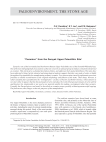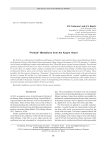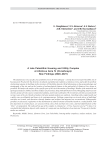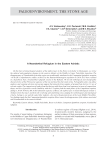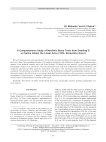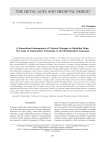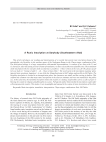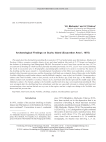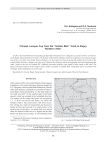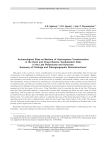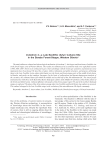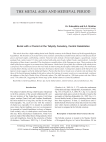Paleoenvironment, the stone age. Рубрика в журнале - Archaeology, Ethnology & Anthropology of Eurasia
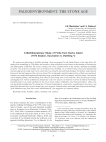
A multidisciplinary study of finds from Suchu island (1973 season, excavation II, dwelling 1)
Статья обзорная
Бесплатно
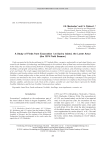
A study of finds from excavation I at Suchu island, the Lower Amur (the 1974 field season)
Статья
Бесплатно
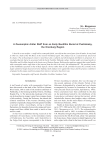
A zoomorphic antler staff from an Early Neolithic burial at Pushkinsky, the Orenburg region
Статья обзорная
Бесплатно
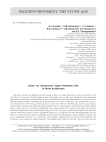
Aktas-an “ephemeral” Upper Paleolithic site in North Kazakhstan
Статья научная
This paper presents new findings from field studies at Aktas, an Upper Paleolithic site first excavated in 1982 and 1983. It is located in North Kazakhstan, where Paleolithic sites are quite rare. We describe the stratigraphy, paleontology, archaeology, and chronology of Aktas. Six lithological layers are distinguished, two of which (3 and 4) abound in faunal remains. Chronology was generated from a new series of OSL-ages. The accumulation of layer 2 took place between ca 20–12 ka ago, whereas layers 3 and 4 were formed ca 50–30 ka ago. A side-scraper, made of imported flint, was found. The bulk of the faunal complex relates to large ungulates such as Pleistocene horse (Equus ferus), woolly rhinoceros (Coelodonta antiquitatis), and mountain sheep (Ovis ammon). Some bones bear traces of deliberate fragmentation and dismemberment using stone tools. These facts, along with the taphocenotic indicators (species composition, absence of traces of predator activity, etc.), as well as the location and stratigraphy of the site, allow us to conclude that the faunal assemblages at this location are anthropogenic. Traces of human occupation are scarce, suggesting that Aktas is an “ephemeral” site, attesting to human presence in that territory during the Late Pleistocene, but revealing no cultural indicators. The findings picture Aktas as a kill-site—the place where the prey was butchered and consumed. This is the only such site known in the area to date. The number of lithics is too small for cultural attribution. However, the estimated age suggests that North Kazakhstan was peopled as early as the beginning of MIS3, corresponding to the early stages of the Upper Paleolithic.
Бесплатно
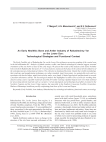
Статья научная
The Early Neolithic site of Rakushechny Yar on the Lower Don evidences successive peopling of the coastal zone in the 6th millennium BC. Analysis of faunal remains, toolkit, and limited technological contexts suggest seasonal orientation of the site shown at least at the early stages. We present the results of the analysis of the Early Neolithic bone tools from Rakushechny Yar layers 23–11 of excavation I, and assess their place in the context of bone industries of the contemporaneous archaeological cultures. The collection is dominated by points. Despite the variable morphology, their preforms and manufacturing techniques are rather standard. Apart from points, two spatula-like tools and two specimens with beveled edges, made from red-deer antler, were found. A limited typological and functional set reveals a peculiar subsistence activity. The traceological analysis has highlighted a stable series of tools for working skins and processing coarse vegetable materials (possibly for basket weaving). Spatula-shaped tools were likely destined for processing mineral materials such as ceramics. Certain typological and technological parallels are found in the Northern Caspian and the Lower Volga regions, but especially in the Southern Caucasian Neolithic (Aratashen-Shulaveri-Shomutepe) traditions possibly originating from those of the Levant and Zagros.
Бесплатно
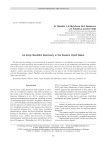
An Early Neolithic sanctuary in the Eastern Irtysh basin
Статья научная
We describe the findings of excavations at an unusual sanctuary in the Baraba forest-steppe. It is a structure consisting of a ditch encircling the presumed sacral space, and a system of pits containing non-utilitarian artifacts. Pits in the bottom of the ditch indicate wooden structures, which are not preserved. Descriptions of the features are provided. Artifacts are related to household, manufacturing, and ritual. On the basis of stratigraphy and radiocarbon analysis, relative and absolute chronology is assessed. The site dates to the 7th–6th millennia BC and is associated with the Barabinskaya culture. Parallels with Mesolithic and Neolithic sanctuaries and ritual sites in the Eurasian taiga zone are listed.
Бесплатно
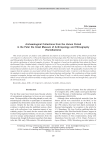
Статья научная
This article presents an analysis and additional description of archaeological items of the Jōmon period from A.V. Grigoriev’s collection (No. 1294) at the Department of Archaeology of the Peter the Great Museum of Anthropology and Ethnography (Kunstkamera) RAS in St. Petersburg. The study focuses on the description of decorative motifs and the stylistic attribution of selected samples of pottery. The analysis is based on the published data about the Ōmori shell mound (Tokyo, Honshu Island), visited by Grigoriev in 1878 as a part of the expedition from the Imperial Russian Geographical Society. The early stage of the Japanese archaeology is described with reference to the Ōmori shell mound. Special attention is given to specific features of the Jōmon decorative style. The geographic location of the site suggests that the samples are associated with the Kasori B and Horinouchi styles. Contrary to the Russian tradition, the emphasis is made on stylistic interpretation rather than technology and typology. The combinations of large zonally arranged rectangular designs and spiral motifs are typical of the Kasori B style, to which several samples belong. Others reveal vertically and horizontally arranged patterns consisting of incised arcuate and straight lines, typical of the Horinouchi style.
Бесплатно

